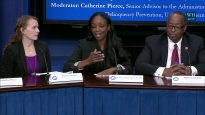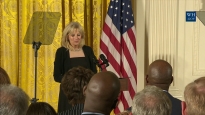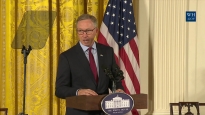President Obama Nominates Elena Kagan for Supreme Court
May 10, 2010 | 14:05 | Public Domain
The President introduces Elena Kagan, the current Solicitor General, as his nominee to replace retiring Justice John Paul Stevens on the Supreme Court.
Remarks by the President and Solicitor General Elena Kagan at the Nomination of Solicitor General Elena Kagan to the Supreme Court
10:02 A.M. EDT
THE PRESIDENT: Hello, hello, hello! Thank you. (Applause.) Thank you very much. Everybody, please have a seat.
Good morning, everybody. Of the many responsibilities accorded to a President by our Constitution, few are more weighty or consequential than that of appointing a Supreme Court justice -- particularly one to succeed a giant in the law like Justice John Paul Stevens.
For nearly 35 years, Justice Stevens has stood as an impartial guardian of the law, faithfully applying the core values of our founding to the cases and controversies of our time.
He has done so with restraint and respect for precedent -- understanding that a judge’s job is to interpret, not make law -- but also with fidelity to the constitutional ideal of equal justice for all. He’s brought to each case not just mastery of the letter of the law, but a keen understanding of its impact on people’s lives. And he has emerged as a consistent voice of reason, helping his colleagues find common ground on some of the most controversial and contentious issues the Court has ever faced.
While we can't presume to replace Justice Stevens’ wisdom or experience, I have selected a nominee who I believe embodies that same excellence, independence, integrity, and passion for the law -- and who can ultimately provide that same kind of leadership on the Court: our Solicitor General, and my friend, Elena Kagan. (Applause.)
Elena is widely regarded as one of the nation’s foremost legal minds. She’s an acclaimed legal scholar with a rich understanding of constitutional law. She is a former White House aide with a lifelong commitment to public service and a firm grasp of the nexus and boundaries between our three branches of government. She is a trailblazing leader -- the first woman to serve as Dean of Harvard Law School -- and one of the most successful and beloved deans in its history. And she is a superb Solicitor General, our nation’s chief lawyer representing the American people’s interests before the Supreme Court, the first woman in that position as well. And she has won accolades from observers across the ideological spectrum for her well-reasoned arguments and commanding presence.
But Elena is respected and admired not just for her intellect and record of achievement, but also for her temperament -- her openness to a broad array of viewpoints; her habit, to borrow a phrase from Justice Stevens, “of understanding before disagreeing”; her fair-mindedness and skill as a consensus-builder.
These traits were particularly evident during her tenure as dean. At a time when many believed that the Harvard faculty had gotten a little one-sided in its viewpoint, she sought to recruit prominent conservative scholars and spur a healthy debate on campus. And she encouraged students from all backgrounds to respectfully exchange ideas and seek common ground -- because she believes, as I do, that exposure to a broad array of perspectives is the foundation not just for a sound legal education, but of a successful life in the law.
This appreciation for diverse views may also come in handy as a die-hard Mets fan serving alongside her new colleague-to-be, Yankees fan Justice Sotomayor, who I believe has ordered a pinstriped robe for the occasion. (Laughter.)
But while Elena had a brilliant career in academia, her passion for the law is anything but academic. She has often referred to Supreme Court Justice Thurgood Marshall, for whom she clerked, as her hero. I understand that he reciprocated by calling her “Shorty.” (Laughter.) Nonetheless, she credits him with reminding her that, as she put it, “behind law there are stories -- stories of people’s lives as shaped by the law, stories of people’s lives as might be changed by the law…”
That understanding of law, not as an intellectual exercise or words on a page, but as it affects the lives of ordinary people, has animated every step of Elena’s career -- including her service as Solicitor General today.
During her time in this office, she’s repeatedly defended the rights of shareholders and ordinary citizens against unscrupulous corporations. Last year, in the Citizens United case, she defended bipartisan campaign finance reform against special interests seeking to spend unlimited money to influence our elections. Despite long odds of success, with most legal analysts believing the government was unlikely to prevail in this case, Elena still chose it as her very first case to argue before the Court.
I think that says a great deal not just about Elena’s tenacity, but about her commitment to serving the American people. I think it says a great deal about her commitment to protect our fundamental rights, because in a democracy, powerful interests must not be allowed to drown out the voices of ordinary citizens.
And I think it says a great deal about the path that Elena has chosen. Someone as gifted as Elena could easily have settled into a comfortable life in a corporate law practice. Instead, she chose a life of service -- service to her students, service to her country, service to the law and to all those whose lives it shapes.
And given Elena’s upbringing, it’s a choice that probably came naturally. Elena is the granddaughter of immigrants whose mother was, for 20 years, a beloved public schoolteacher -- as are her two brothers, who are here today. Her father was a housing lawyer, devoted to the rights of tenants. Both were the first in their families to attend college. And from an early age, they instilled in Elena not just the value of a good education, but the importance of using it to serve others.
As she recalled during her Solicitor General confirmation hearings, “Both my parents wanted me to succeed in my chosen profession. But more than that, both drilled into me the importance of service, character, and integrity.”
Elena has also spoken movingly about how her mother had grown up at a time when women had few opportunities to pursue their ambitions and took great joy in watching her daughter do so.
Neither she, nor Elena’s father, lived to see this day. But I think her mother would relish this moment. I think she would relish -- as I do -- the prospect of three women taking their seat on the nation’s highest Court for the first time in history. (Applause.) A Court that would be more inclusive, more representative, more reflective of us as a people than ever before.
And I think they would both be tremendously proud of their daughter -- a great lawyer, a great teacher, and a devoted public servant who I am confident will make an outstanding Supreme Court justice.
So I hope that the Senate will act in a bipartisan fashion, as they did in confirming Elena to be our Solicitor General last year, and that they will do so as swiftly as possible, so she can get busy and take her seat in time to fully participate in the work of the Court this fall.
With that, I would like to invite the person who I believe will be the next Supreme Court justice of the United States, Elena Kagan, to say a few words. (Applause.)
SOLICITOR GENERAL KAGAN: Thank you, Mr. President. I am honored and I am humbled by this nomination and by the confidence you have shown in me.
During the last year as I have served as Solicitor General, my longstanding appreciation for the Supreme Court’s role in our constitutional democracy has become ever deeper and richer. The Court is an extraordinary institution in the work it does and in the work it can do for the American people by advancing the tenets of our Constitution, by upholding the rule of law, and by enabling all Americans, regardless of their background or their beliefs, to get a fair hearing and an equal chance at justice.
And within that extraordinary institution, Justice Stevens has played a particularly distinguished and exemplary role. It is, therefore, a special honor to be nominated to fill his seat.
I have felt blessed to represent the United States before the Supreme Court, to walk into the highest Court in this country when it is deciding its most important cases, cases that have an impact on so many people’s lives. And to represent the United States there is the most thrilling and the most humbling task a lawyer can perform.
I’ve been fortunate to have been supported in all the work I’ve done as Solicitor General by a remarkable group of lawyers and staff, many of whom are here today. They exemplify professionalism, public service and integrity. And I am grateful for all that they have taught me.
My professional life has been marked by great good fortune. I clerked for a judge, Abner Mikva, who represents the best in public service, and for a Justice, Thurgood Marshall, who did more to promote justice over the course of his legal career than did any lawyer in his lifetime.
I have had the opportunity to serve under two remarkable Presidents who have devoted themselves to lifting the lives of others and to have inspired a great many more to do the same.
I had the privilege of leading one of the world’s great law schools and of working there to bring people together and to help ensure that they and the school were making the largest possible contribution to the public good, both in this country and around the world. I am proud of what all of us accomplished there.
And through most of my professional life, I’ve had the simple joy of teaching -- of trying to communicate to students why I so love the law not just because it’s challenging and endlessly interesting -- although it certainly is that -- but because law matters; because it keeps us safe; because it protects our most fundamental rights and freedoms; and because it is the foundation of our democracy.
I'm thankful to my brothers and other family and friends for coming to Washington to be with me here today. And much more, I am thankful for all of their support and loyalty and love, not just on this day but always.
If this day has just a touch of sadness in it for me, it is because my parents aren’t here to share it. They were both, as the President said, the children of immigrants and the first in their families to go to college. My father was the kind of lawyer who used his skills and training to represent everyday people and to improve a community. My mother was a proud public schoolteacher, as are my two brothers -- the kind of teachers whom students remember for the rest of their lives.
My parents’ lives and their memory remind me every day of the impact public service can have, and I pray every day that I live up to the example they set.
Mr. President, I look forward to working with the Senate in the next stage of this process. And I thank you again, Mr. President, for this honor of a lifetime. Thank you so much. (Applause.)
END
10:17 A.M. EDT
|
November 15, 2016
|
November 15, 2016
|
November 14, 2016
|
November 14, 2016
|
|
November 14, 2016
|
November 14, 2016
|
November 14, 2016
|
November 14, 2016
|
- &lsaquo previous
- …
- 8
- 9
- 10
- 11
- 12
- 13
- 14
- 15
- 16
- …
- next &rsaquo







